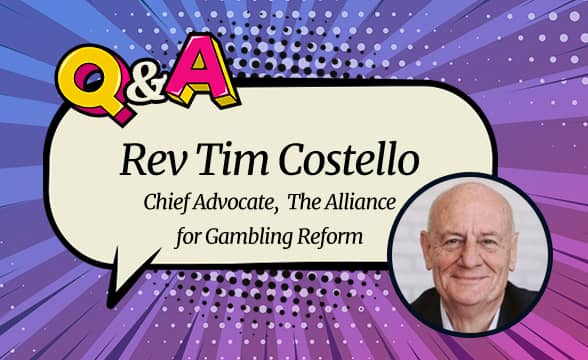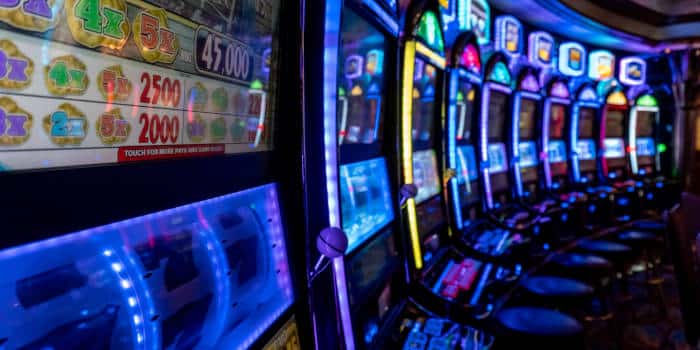- Casino
- By State
- Alabama
- Alaska
- Arizona
- Arkansas
- California
- Colorado
- Connecticut
- Delaware
- Georgia
- Florida
- Hawaii
- Idaho
- Illinois
- Indiana
- Iowa
- Kansas
- Kentucky
- Louisiana
- Maine
- Massachusetts
- Maryland
- Michigan
- Minnesota
- Mississippi
- Missouri
- Montana
- Nebraska
- Nevada
- New Hampshire
- New Jersey
- New Mexico
- New York
- North Carolina
- North Dakota
- Ohio
- Oklahoma
- Oregon
- Pennsylvania
- Rhode Island
- South Carolina
- South Dakota
- Tennessee
- Texas
- Utah
- Vermont
- Virginia
- Washington
- West Virginia
- Wisconsin
- Wyoming
- By State
- Slots
- Poker
- Sports
- Esports
AGR Rev Tim Costello on the Role of Cashless Cards in Tackling Gambling Addiction and Money Laundering

New South Wales and Australia have the opportunity to kill two birds with one stone. A proposed gaming card could help minimize the impact of harmful gambling as well as bite deeply in illicit receipts that have been generated at poker machines all across the country.
The card would ask players to register and charge up a balance, making it easier for relevant authorities to track expenditures and the source of funds and for gambling establishments to centralize their registers and monitor player activity for vulnerable gamblers.
This measure was pitched around the same time the investigation into Crown Resorts established that the company’s pokies had often been used for the purposes of money laundering. Today, the solution is at hand, but some seem to oppose it.
The Alliance for Gambling Reform, however, has remained adamant that to avoid introducing the proposed gaming card is an attempt to avoid responsibility in the first place.
Today, we have the opportunity to find out more about the issue and how important it is to see the gaming card succeed as a prerequisite for gaming in the country and NSW. Here with us is Alliance for Responsible Gambling chief advocate Rev Time Costello.
Q: How important is it to see a gaming card that would add more transparency into gambling passed through?
The proposed cashless gambling system in NSW is incredibly important, especially as NSW is the most pokies-captured state in the world outside of Nevada and its Las Vegas. There are 91,000 poker machines operating in NSW, and they take $18.5 million every single day from our communities and economy.
Gambling harm is a significant public health issue in Australian communities. It is connected to mental ill-health, family breakdowns, domestic violence, homelessness and even deaths by suicide.
Introducing a system where people could track their losses and be able to put limits on their spending would be very helpful to many. If load limits are low then people have to take a break from their gambling to add money to their card or digital wallet, and research shows this can be an effective way to help people rethink their gambling and how much they are losing. It is also an effective back-up to self-exclusion measures, which are currently difficult to monitor and implement as the system is so lax.
A system like this linked to ID would also all but eliminate money laundering via poker machines, which are widely acknowledged as the easiest way to launder money in Australia.
Q: Do you think there is any reason for concern about the implementation of such solutions for the end consumers?
We certainly have concerns that the gambling industry will manipulate the process in their own favour. The industry’s best customers are the ones who are experiencing the worst gambling harm. They don’t want their profits put at risk. They seem to forget those profits are coming at the cost of destroyed lives.
Q: Do you accept stakeholders’ argument that making their businesses compatible with this card would generate thousands of job losses? Are there any factual studies to back this claim?
We definitely do not accept this argument. The gambling industry is notorious for including every single staff member under the umbrella of gambling when they make these claims, from the cleaner through to the chef — all of those jobs exist without gambling. Less money being lost to gambling increases the number of jobs in Australia. Research by the South Australian Centre for Economic Studies has shown that for every $1 million spent on food in the hospitality industry that equals 20 jobs, contrasted with just three jobs for $1 million spent on gambling.
It’s time the gambling industry stopped kidding themselves that they are job creators — they are job thieves.
Q: What are the real costs of implementing the card and would it ultimately be beneficial for the economy?
Reducing money laundering via poker machines would have a tremendous benefit to the Australian economy. Of course, we understand that this proposed system will not eliminate money laundering all together, but it would remove the single easiest way to launder money – literally, thousands of dollars can be laundered via poker machines in just minutes right now, and there is evidence to show that is happening.
Reducing gambling harm would also have a tremendous benefit to the economy. A study commissioned by the VRGF showed that while the gambling industry contributed $2 billion in taxes to Victoria every year, the health and social cost of dealing with gambling costs $7 billion. That’s a $5 billion net loss to the Victorian economy every single year, and that is just one state in Australia.
Gambling is an effective drain on the Australian economy and it is time our governments woke up to this fact.
Q: Are there good examples of cashless gaming solutions elsewhere Australia can learn from?
We do not know of any similar systems in place around Australia, but we do know that Crown Perth is trialling a much worse digital system. They are testing tap-and-go payments, allowing customers to purchase chips at the table, paying on an EFTPOS machine brought to them by staff. This only encourages excessive gambling. In 2009 Queensland trialled a similar system to the card being discussed in NSW, with good customer engagement. It appears that industry pressure prevented it from being introduced. TITO and MIMO systems are in use or approved in several states, which means customers are already exposed to partially cashless gambling.
Q: Would the introduction of a gaming card be enough to address the issues of money laundering and problem gambling at their core or just a good step forward?
In terms of money laundering, this is an almost silver bullet solution. Criminals will not want their identities recorded. As transaction limits would be much lower than the current allowed load up of $7500, it will simply not be possible to process the sums needed for quick and easy money laundering.
Reducing gambling harm is definitely a step in the right direction. There are a host of other reforms needed to truly reduce gambling harm in Australia though. These include removing “losses disguised as wins” from poker machines, reduced operating hours for venues, an end to gambling advertising, and a ban on loyalty schemes.
Q: How soon do you expect such a solution to be available?
The sooner a solution is introduced the better it will be for our communities and the people who are devastated by gambling harm every single day in NSW. We do expect a short trial of the technical solutions and then a public review based on evaluations of the trial is imminent. After that, we expect a well-regulated system to be rolled out over a couple of years, as it will take time to modify 91,000 machines and train up staff. We are confident most customers will adjust to the cashless environment.
Q: What is the Alliance for Gambling Reform’s biggest commitment for 2021?
Certainly the introduction of a cashless gambling system in NSW is a priority for us this year, as is the self-exclusion legislation currently being drafted in NSW.
We will continue our push to #EndGamblingAds as this not only has an impact on adults but is especially important to stop our children from being groomed to become gamblers and to view gambling as an essential part of the sport. It’s not, and this must be stopped.
The Victorian and Western Australian Royal Commissions into Crown are also of importance to the Alliance this year.
Mike made his mark on the industry at a young age, consulting for companies that would later become regulators. As one of the lead editor of Gambling News, he dedicates his weekdays to this project, aiming to educate the masses on the latest developments in the gambling circuit. His expertise and passion for the industry make him an invaluable asset to our team.
Must Read
Insider
May 15, 2025
Joshua Gamble: “Cross-sell is dead. What next?”
More Articles






Casino
July 11, 2025
IGT Reveals Multiple Jackpots Throughout June

Casino
July 11, 2025
Caesars Introduces Digital Wallet in Nevada

Business
July 10, 2025
DoubleDown Acquires Whow Games in €65 Million Deal

Casino
July 10, 2025
Cirsa Shares Hold Steady in Lukewarm Spanish IPO Debut

Casino
July 10, 2025
Mohegan Sun Guest Wins $2M Gambling in Spanish 21










